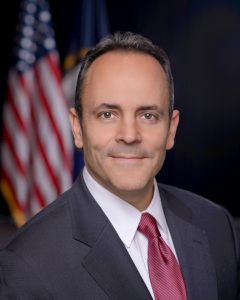
Photo: Cabinet for Health and Family Services
Racial disproportionality and disparities for youth and families of color in the area of child welfare services will be the topic of statewide meeting this week.
The Kentucky Cabinet for Health and Family Services’ (CHFS) Department for Community Based Services (DCBS), Hardin County Family Court Judge Brent Hall, and community leader and juvenile justice advocate Pastor Edward Palmer will host the annual meeting of the Race Community and Child Welfare (RCCW) Initiative on Thursday, Nov. 9, from 9 a.m. to 3 p.m. at the Elizabethtown Tourism Center, 1030 North Mulberry St., Elizabethtown, Ky.
DCBS Commissioner Adria Johnson said the forum lets child welfare partners discuss strategies to remove barriers for children and families of color.
“Racial disproportionality is prevalent in Kentucky’s child welfare program, but by focusing attention to solutions that are specific to the problem, we can preserve families and achieve good outcomes for all children,” Johnson said.
In Kentucky, racial disproportionality and disparate outcomes for children of color occur across all public systems. Nationally, children of color are overrepresented in child serving agencies such as education, child welfare and juvenile justice in comparison to their percentage of the population.
Disparate outcomes include children of color removed from their homes and entering out of home care at a rate one and a half times to that of white children. Data shows that children of color are:
- less likely to achieve permanency when exiting out of home care
- less likely to graduate from high school
- more likely to be suspended from school
- are more likely to be committed to the Department of Juvenile Justice for offenses and
- more likely to be referred to criminal court as a youthful offender.
The RCCW Initiative engages public system and community partners in developing and evaluating local collaborations and strategies aimed at eliminating disparities for children of color in the child welfare system. In the last year, Hardin County collaborative efforts have eliminated the overrepresentation of African-American children entering foster care in that county. The percentage of children of African-American heritage entering foster care in Hardin County is lower than their representational percentage of all children in the county.
Johnson said the state’s RCCW program sponsors workshops for DCBS staff, childcare agency providers and other partners to reduce racial bias; provides diversity information for foster parent training and distributes a quarterly newsletter.
Pastor Palmer, of the Sign of the Dove Church in Radcliff, said that racial disparity is a community issue and will take all stakeholders working toward a solution.
“With the number of children in care growing, the state needs support to meet their psychological and biological needs,” Palmer said. “It really takes the village to assist those families in crisis, to facilitate better outcome for families and children.”
Palmer provides a visitation center at his church for parents and children removed and in foster care to visit frequently thereby increasing the chances of reunifying the family.
Judge Hall said that Family Court judges like himself play an important role in listening to families and encouraging the development of community supports to meet the needs of vulnerable families.
“Judicial leadership is critical to setting expectations for family engagement for all involved with families dealing with child maltreatment,” Hall said.
Judge Hall helps facilitate Hardin County’s Minority Advisory Council, which focuses on improving child protection and court processes, resources and family engagement. Hall recently led a training session of 25 participants, which included court personnel, Foster Care Review Board members, Family Resource Center Coordinators, CASA advocates and community members.
Judge Karen Howze, a national expert on cultural competency and Judge in Residency with the National Council for Juvenile and Family Court Judges, will also speak at the annual meeting.
For more information about DCBS programs and Kentucky child welfare, log on to http://chfs.ky.gov/dcbs/.
For more information about how you can become a foster or adoptive parent, or to get more general information about supporting families in the child welfare system, email: openhearts@ky.gov, visit the state adoption website adopt.ky.gov, which helps families more easily navigate the foster care and adoption process or call 1-800-232-KIDS (5437).
 Members of the faith-based community in the Louisville area are invited to learn more about Governor Matt Bevin’s “Open Hearts/Open Homes” initiative during a series of breakfast events later this month.
Members of the faith-based community in the Louisville area are invited to learn more about Governor Matt Bevin’s “Open Hearts/Open Homes” initiative during a series of breakfast events later this month.
The Jefferson County Office of the Department for Community Based Services (DCBS), which coordinates the foster care and adoption program within the Cabinet for Health and Family Services (CHFS), is sponsoring several free “Kickoff Breakfasts” for faith-based community partners. Everyone is invited for a meal and fellowship to discuss the state’s need for more adoptive families.
Gov. Bevin launched Open Hearts/Open Homes in March at a Frankfort summit of more than 200 partners as part of his pledge to improve the state’s adoption and foster care system. Open Hearts/Open Homes aims to find permanent placements for those children in foster care with a goal of adoption by relying on the state’s churches, nonprofit groups and caring individuals.
Gov. Bevin said he hopes to see the Louisville-area network of churches become involved in Open Hearts/Open Homes.
“We are asking our churches to help lead on this issue,” Gov. Bevin said. “Church leaders and members are encouraged to consider the life-changing journey of foster care and adoption. With the commitment of these incredible communities, we can give these children the forever homes with loving families.”
Of the state’s 8,000 plus children in out of home care, more than 1,000 are in Jefferson County. Each session begins at 9 a.m. and include a short presentation about the foster care and adoption program and a question and answer session with those in attendance. Each event will close with prayer at 10 a.m.
Here is the schedule for the breakfast sessions in Louisville this month.
- April 25: Bridges of Hope Neighborhood Place, 1411 Algonquin Parkway
- April 26: Charmoli Neighborhood Place (Middletown), 200 Juneau Drive, Suite 200
- April 27: Fairdale Neighborhood Place (Fairdale), 1000 Neighborhood Place (off National Turnpike, behind the South Park TAPP School)
- April 28: Youth for Christ Building, 4102 W. Market St.
Because of limited seating, RSVPs are required and should be sent to patricia.franke@ky.gov. Please limit number of attendees to two per organization.
CHFS Secretary Vickie Yates Brown Glisson said Gov. and First Lady Glenna Bevin are putting all Kentucky children first in their efforts to improve the Commonwealth.
“Gov. Bevin and the First Lady are exceptional ambassadors for our foster and adoption services,” Glisson said. “Thanks to the Governor’s servant leadership we are now in position to discuss the great need around this issue and engage many more loving families into the foster and adoptive communities.”
For more information about how you can become a foster or adoptive parent, or to get more general information simply email: openhearts@ky.gov, go to the state adoption website adopt.ky.gov, which helps families more easily navigate the foster care and adoption process or call 1-800-232-KIDS (5437).
 Weather
Weather Traffic
Traffic @LouisvilleDispatch
@LouisvilleDispatch @LouisvilleDisp
@LouisvilleDisp Subscribe
Subscribe